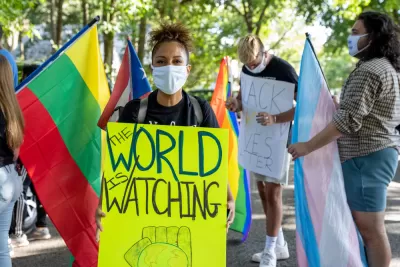State activists say eviction cases were filed in violation of the CARES Act’s ban on evictions. Pre-trial settlement conferences are further complicating the situation.

The COVID-19 pandemic has had a devastating economic impact on renters across the United States. Though several states issued moratoriums on evictions earlier this year and the Centers for Disease Control recently ordered a federal eviction moratorium that will last through the end of 2020, these actions have not and will not stop landlords from trying to remove tenants from their homes for nonpayment of rent.
In many cases, the CDC’s nationwide eviction moratorium does not affect a state’s specific eviction moratorium, offering no extra security for tenants who are already facing the threat of being removed from their homes. In all cases, tenants will still owe rent to their landlords, and in many cases landlords can still file eviction complaints in the courts. In New Jersey, for instance—despite a temporary ban on evictions from federally financed properties via the CARES Act, a statewide eviction moratorium for all renters, and suspended eviction court proceedings—30,000 eviction complaints have been filed since March, and many tenants have lost their homes. Tenants’ rights advocates and lawyers say a number of pending eviction cases filed between March and July 25, when the CARES Act protections expired, are in violation of the federal law.
Taking a closer look at what has happened in the Garden State these last several months could provide guidance on how the CDC’s broader eviction moratorium could be better enforced, and what advocates should be paying attention to.
Pre-trial Eviction Settlement Conferences
In March, New Jersey Gov. Phil Murphy issued ....
FULL STORY: The CARES Act Was Supposed to Protect NJ Tenants from Eviction. It Didn’t.

Planetizen Federal Action Tracker
A weekly monitor of how Trump’s orders and actions are impacting planners and planning in America.

Congressman Proposes Bill to Rename DC Metro “Trump Train”
The Make Autorail Great Again Act would withhold federal funding to the system until the Washington Metropolitan Area Transit Authority (WMATA), rebrands as the Washington Metropolitan Authority for Greater Access (WMAGA).

The Simple Legislative Tool Transforming Vacant Downtowns
In California, Michigan and Georgia, an easy win is bringing dollars — and delight — back to city centers.

The States Losing Rural Delivery Rooms at an Alarming Pace
In some states, as few as 9% of rural hospitals still deliver babies. As a result, rising pre-term births, no adequate pre-term care and "harrowing" close calls are a growing reality.

The Small South Asian Republic Going all in on EVs
Thanks to one simple policy change less than five years ago, 65% of new cars in this Himalayan country are now electric.

DC Backpedals on Bike Lane Protection, Swaps Barriers for Paint
Citing aesthetic concerns, the city is removing the concrete barriers and flexposts that once separated Arizona Avenue cyclists from motor vehicles.
Urban Design for Planners 1: Software Tools
This six-course series explores essential urban design concepts using open source software and equips planners with the tools they need to participate fully in the urban design process.
Planning for Universal Design
Learn the tools for implementing Universal Design in planning regulations.
Smith Gee Studio
City of Charlotte
City of Camden Redevelopment Agency
City of Astoria
Transportation Research & Education Center (TREC) at Portland State University
US High Speed Rail Association
City of Camden Redevelopment Agency
Municipality of Princeton (NJ)





























